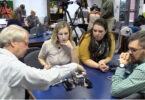In a recent IBM research study, 1,500 CEOs from around the globe cited an increasingly complex world as their biggest challenge and creativity as “the single most important leadership competency” for business success.
Many economic experts have tied any society’s economy to its ability to attract and retain creative people, according to Bonnie Cramond, a professor of gifted education and director of the University of Georgia’s E. Paul Torrance Center for Creativity & Talent Development.
“We have seen a dramatic increase in contact from businesses and foreign organizations in the last year,” she said. “We think UGA has a unique value in having the Torrance Center, with its international reputation, and we want our students and faculty to benefit from it.”
Cramond and her colleagues in the College of Education and across the UGA campus are making that happen by launching a new graduate-level Interdisciplinary Certificate in Creativity and Innovation program in spring 2014.
The program will enable graduate students in any discipline to add a certification to their degree by taking 15 hours of courses-nine hours of core courses in creativity and six hours of approved electives.
The core courses are mostly in the COE’s department of educational psychology, but some focus on topics from business management to social work. The elective courses range across many disciplines including art, educational leadership, journalism, science education, food science, geography, language and literacy education, and Spanish.
“We hope that as people learn about it across campus, we’ll have more faculty interested in offering courses,” said Cramond. “We plan to provide support for faculty who wish to create or tweak courses that could be core courses or electives through UGA’s Center for Teaching and Learning. The core courses must deal with basic theory and research on creativity and innovation. Electives should support this learning through extension and application in specific disciplines.”
The new program has received letters of support from potential employers in academia and various businesses, many stating that such a certificate would provide an edge to applicants who possess it. Others like the interdisciplinary nature of the program, which is structured to promote collaborations and innovative problem-solving, according to Cramond.
“I had the idea for a certificate program in creativity several years ago, but didn’t have the resources to develop it,” she said. “The program is now the culmination of several people’s ideas, including those of Sarah Sumners, the assistant director of the Torrance Center, and Garrett Jaeger, a doctoral student in educational psychology.”
While there are other creativity certificate or degree programs across the nation, none is quite like UGA’s, according to Cramond. “Most programs with creativity in the title are based in art, business or psychology, and do not really promote the interdisciplinary aspects as we do,” she said.
Cramond is internationally recognized as an expert in gifted education and creativity. She is also a former graduate student of Torrance, the late UGA Distinguished Professor known around the world as the “Father of Creativity” for his pioneering research in the field.








